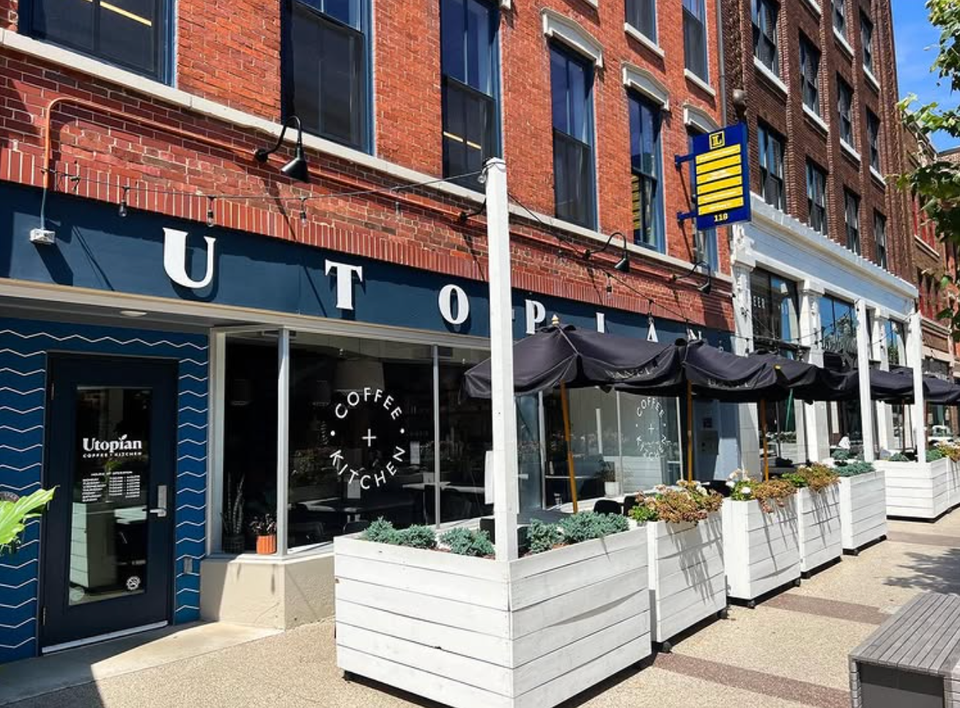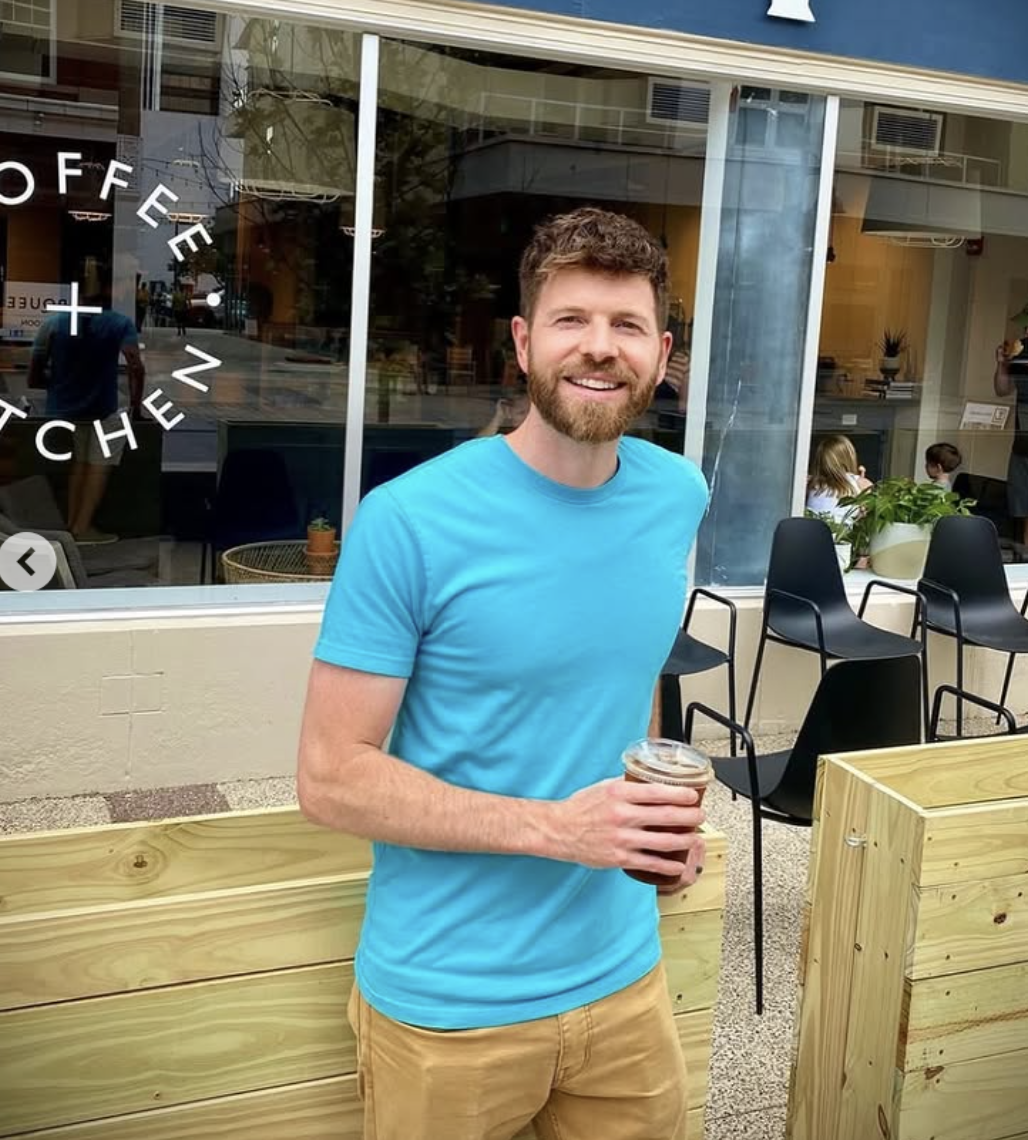Deeper Dive: What's next for Utopian Coffee in 2025?

You might have heard the news: Utopian Coffee is reaching the end of its five-year lease The Landing, and it's not renewing—meaning its popular cafe will close later this spring.
Since we're partnering with Utopian this month, Co-Owner Brendon Maxwell reached out to us last week to share the news, and reassure readers that the cafe is still open to redeem your deal this month. He also wanted to dispel rumors that the closure might be part of a trend of small business closures Downtown.
Maxwell says Utopian’s cafe on The Landing has been cash-flow positive, but operating a coffee shop was not originally part of his plans for the business, which focuses on partnering with global coffee farmers and producers to source and roast unique and sustainable blends. About five years ago, when he leased an upstairs space on The Landing for Utopian’s roastery (as well as The Landing Beer Co. beneath it), the lease included the cafe.
Since then, Utopian’s roastery has outgrown its space on The Landing and relocated to a 30,000 sq. ft. warehouse on South Calhoun Street near Tall Rabbit Cafe, where Maxwell and his team have a new project underway.
“We’re actually building a coffee lab right now at the roastery,” he says. “It will function similar to a distillery with tastings and tours, and even though it won’t be open to the public every day, like a cafe, it will still allow us to host special events and engage the public.”
We sat down with Maxwell to get details on the cafe closure, his experience on The Landing, and what’s next for Utopian's business.

First things first: When is Utopian planning to close its cafe on The Landing, and will you be hosting any events or deals to commemorate your time there?
BM: The plan is to wrap things up at the end of Spring or early Summer. We do not yet have a final date, as we want to make the transition as easy as possible for everyone, especially staff. We will be giving them plenty of notice and want to help ensure they land firmly on their feet with the next operator here or their next venture elsewhere. We also want to honor Model Group, as they have been amazing to work with. So, if there is a concept (wanting to lease our cafe space) that needs a little more or less time, we’re willing to be flexible as long as there is enough notice.
And yes, we’re talking about what we can do between now and then to show that this truly is a celebration of our time here. In addition to a couple of events being discussed, we’re definitely going to do a “Grand” event at the end (similar to a Grand Opening) to celebrate our staff and loyal customers.
What will happen to the workers at Utopian’s cafe?
BM: We haven’t gotten that far into the conversation with each of them individually, as they are still processing the news. The main reason that we wanted to announce it at this stage was to make sure that they have plenty of time to figure out next steps. Our commitment is to support them however we can, whether introducing them to people within the industry, the next operator (which is yet to be determined) of this location, or someone outside of the industry in an area they are interested in working. This is new for everyone, but we’re going to make sure they are taken care of.
When did Utopian relocate its roastery to South Calhoun Street, and what inspired you to choose that location?
BM: We started roasting out of our (South Calhoun Street) facility in Spring of 2022. We wanted to stay as close to Downtown as possible, as we love the vibe of city life and want our employees to be part of that. I have long had a heart for S. Calhoun (attended South Side HS for a couple of years!) and believe that this is an awesome area! We also needed a building that could accommodate receiving shipments of green coffee, have plenty of space to roast, and include some room to grow, and this building fit the bill.
How much coffee does Utopian roast each year, and for those who aren’t familiar, how would you describe what makes Utopian’s coffee unique, flavor-wise?
BM: Utopian roasts ~500,000 lbs per year, and what makes us particularly unique is the way we source our product and invest in the roasting process. From the beginning, our desire has always been to support coffee farmers and build relationships to highlight the hard work that goes into their part of the craft. We travel the globe to come alongside these incredible producers to find coffees that live at the intersection of impact and quality.
Once you understand how and where the coffee was grown, you can better understand how to roast to bring about its unique characteristics. Like other craft beverage industries, we believe in doing things well across the spectrum of taste profiles and don’t believe that those spectrums have to be mutually exclusive. Like a winebar that has both a great Pinot Gris and a Cabernet Sauvignon, we like to meet the customer where they are and introduce them to a range of coffees, some that might push them outside of their comfort zone, but allow them to explore a whole new world.
We have an incredibly talented roasting team with awards that include a 2022 US Coffee Champ title, Good Food Awards recipient, and many other industry accolades. We don’t live for these awards, but it is nice to be recognized for the passion and care that you have for your craft, so it’s an honor.
Tall Rabbit Cafe is near your new roastery on South Calhoun Street. Can people find Utopian’s coffee brewed fresh there, or at any other local coffee shops?
BM: Yes, Tall Rabbit is a great spot that is a venture of Blue Jacket, an organization doing amazing things to help lower barriers to employment. They lease the space that is in front of our roastery, so we are neighbors. Additionally, within Fort Wayne, you can find Utopian Coffee at The Friendly Fox, The Hive, Proximo, Crescendo Cafe(s), The Bradley, DeBrand, and several others just outside of town.
Utopian was one of the original businesses on The Landing when it opened five years ago. What has it been like to be part of the block’s growth?
BM: It’s been a wonderful experience to be on The Landing. For many years, people didn’t fully understand what we did as a coffee company that didn’t have a shop, so it was fun to engage folks in that way. But the brick-and-mortar retail model is just very different from our core business, and even though they seem to be aligned, it’s hard to bridge that full span from traveling overseas to source the raw product to operating a cafe that sells drinks.
We’re grateful for the opportunity to have been there and learned retail on an incredible block within the city and to see how that block has “set the bar” for other developments around the city. Especially through the spring, summer, and fall, there is no better place to be. The energy down there is magnetic, and taking in the ambiance on a Friday or Saturday night in the summer is one of the best things about this city!
Are there any future plans for Utopian’s cafe on The Landing? What types of businesses do you think might work well there, and how can people who are interested learn more?
BM: The hope is to continue to have it function as a cafe. We know that the model works there and that people desire to have that kind of experience. My wife and I had several conversations, and we were trying to figure out if/how we could run it with a healthy food component (avocado toast, breakfast bowls, etc.) and maybe even add a few evenings per week of wine and charcuterie. I still think that idea would do really well, but I just don’t have the bandwidth to pull that off in the midst of commitments we’ve already made. So, we’re excited for someone to be able to come in there and build upon what’s there and continue to make that space special.
In terms of learning more, the best way would be to reach out to Alex Zyndorf (azyndorf@modelgroup.net) who is overseeing the leasing of the space.
Utopian made headlines last year for its rare Regenerative Organic Certification (ROC) and for qualifying as a finalist for the prestigious 2025 Roaster of the Year award by Roast Magazine. Tell us more about Utopian’s roastery operations and how they’re growing in 2025.
BM: We were really honored to have been a Roaster of the Year finalist, and we’re just continuing to lean forward into figuring out how to have the most impact and create opportunity for people throughout the coffee industry, from producers to roasters to the folks who pack and ship coffee. I know that “sustainability” is a buzzword, but we’ve been focused on creating “careers not jobs” for some time now. It’s why we offer 401K match and health insurance and work with coffee producers overseas to figure out how we can better support them and their goals. Specifically, over the next year or so, we’re excited for our new Coffee Lab, which will be a way to engage the public in tastings and a roastery tour, as well as function as a training facility for our wholesale customers and a spot for our team internally to do quality control and educate staff. This will be ready in the spring, when we’ll do a kickoff event!
Sourcing coffee and working directly with farmers and global coffee producers is also a big part of Utopian’s work. What projects (and trips) do you have on the books for 2025?
BM: Yes, it’s a huge part of what we do and really the heartbeat behind the “why” of the work we do. So far, we have a trip to Honduras (and maybe Guatemala) at the end of March, working on details to visit an emerging coffee region in Sierra Leone in West Africa in May, most likely a trip to Peru in September, and then a tour of Asia (Papua New Guinea, Sumatra, & Laos) planned for late in the year. It’s an absolute honor to highlight the work that coffee producers (farmers) do, so this is my favorite part of the job.
What are some of the challenges and opportunities you’re seeing in the global coffee community?
BM: Well, the most pressing issue facing the global coffee community right now is the unexpectedly high C Market pricing. The challenge is: It is increasing costs rapidly in a way that makes it tough to adjust strategically. The opportunity is that it has the potential to shift the scales a bit toward producers being paid more, but requires a shift in the market all the way through to the end consumer, as the higher prices will likely trickle down to the final beverage cost. Coffee growers haven’t historically been paid well/fair across the board, so this might be the market shift that allows for more of that to happen across the supply chain. In general, rising costs of raw goods (including tariffs, etc) can and will be a challenge, but we believe that the opportunity lies in the relationships we’ve built at both ends of the spectrum, with both farmers and customers, in a way that trust can carry us through tough seasons.
In recent years, you’ve been involved in Fort Wayne’s business community in several ways. Tell us more about some of the challenges and opportunities facing the city and its growth, from your perspective.
BM: I’m bullish on Fort Wayne! I’ve lived in cities on the East coast, West coast, and in other countries, and there is great opportunity here, and it seems like others are realizing it as well. We exist in that sweet spot of having many of the “big city” amenities, while still being able to live affordably (in relation to larger cities) and get around the city without the challenges of major traffic. (I lived in LA, so maybe I’m particularly scarred by that.)
One potential challenge is that we can strive to grow too quickly and cannibalize talent as opposed to attracting and/or developing it. I think we have the opportunity to allow others to come in from outside of the city to help model and showcase what they might be doing in other communities in a way that inspires and brings about growth from within. If we do this effectively, our opportunities are significant.
We also have a beautifully diverse makeup in our city, and my hope is that we can continue to see and experience more of that, as it’s such an asset to and for the city. Having grown up within the school system that includes Weisser Park, Memorial Park, and South Side, from a young age I was exposed to a wide range of cultural, racial, and ethnic backgrounds and experiences. It was a huge part of my life and ultimately, what created the desire to travel and engage in international business. My hope is that we can find a way to bridge gaps and allow for many and more people to have opportunities as the city grows.
